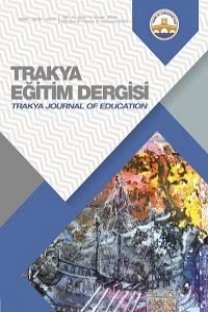TÜRKİYE’DE UYGULANAN OKUL ÖNCESİ EĞİTİM PROGRAMININ ÜSTBİLİŞ BAĞLAMINDA DÜZENLENMESİ
üstbilişin kelime hazinesi, okuma bilinci ve becerileri, anlama, başarı ve öğrenme sorumluluğu üzerinde olumlu etkileri olduğunu ortaya koymuştur. Üstbiliş bağlamında okul öncesi eğitim programının değerlendirilmesi ilerleyen yıllarda çocukların okul başarısını yorumlama ve destekleme açısından önemlidir. Bu çalışma, Türkiye’de uygulanan okul öncesi eğitim programının üstbiliş kuramı bağlamında değerlendirilmesini ve üstbiliş gelişimini destekleyecek şekilde düzenlenmesini amaçlar. Eğitim programına doküman analizi ile erişilmiş ve içerik analizi yöntemiyle incelenmiştir. Kazanım ve göstergeler üstbiliş kuramı çerçevesinde 3 puanlayıcı tarafından değerlendirilmiş ve puanlayıcılar arası tutarlık hesaplanarak, kazanım ve göstergelerdeki üstbiliş bileşenleri hesaplanmıştır. 63 okul öncesi öğretim kazanımının %52’si üstbiliş gelişimini destekleme potansiyeline sahiptir. Üstbiliş gelişimini sosyal ve duygusal alan kazanımları en fazla ve bilişsel alan kazanımları kısıtlı şekilde destekleyebileceği bulunmuştur. Motor gelişim alanında üstbilişi destekleyecek kazanıma rastlanmamıştır. Üstbiliş gelişimini destekleyebilecek 33 kazanım göstergesinin 16’sı bilgi, 10’u beceri, ve 7’si deneyimle ilgilidir. Üstbiliş kuramı ve öğretimi çerçevesinde, programın her bir kazanımı için Ne, Neden, Ne zaman, ve Nasıl kuralı, düşünme dili, sesli düşünme ve öz değerlendirme ilkeleri doğrultusuna göstergeler önerilmiştir. Yenilenen programının etkinliğinin saptanması ve yaygınlaştırılması önerilir.
Anahtar Kelimeler:
okul öncesi, program, üstbiliş
A REVISION OF PRE-SCHOOL EDUCATION CURRICULUM FOR METACOGNITION
Research revealed metacognition positively affects vocabulary, reading awareness and skills, comprehension, achievement, and responsibility for learning. Evaluating the curriculum for metacognition at the pre-school level is essential to interpret and support children's school success in the following years. This study aims to evaluate the Turkish pre-school education program and modify it in a way that supports the development of metacognition. The curriculum was accessed by document analysis and examined by content analysis method. The standards were evaluated by 3 raters and consistency among the raters was calculated to nominate metacognitive components in the standards. 52% of 63 pre-school standards have the potential to support metacognitive development. Social and emotional standards can support metacognitive development the most and cognitive domain standards can support metacognitive development in a limited way. No standards were found to support metacognition in the motor development area. Of 33 standards, 16, 10, and 7 standards may pertain to metacognitive knowledge, skills, and experience, respectively. Indicators were suggested regarding metacognition theory and pedagogy. For this, What, Why, When, and How rule, the language of thinking, thinking aloud, and self-evaluation principles were utilized. It is recommended to identify and disseminate the effectiveness of the renewed program.
Keywords:
pre-school, curriculum, metacognition,
___
- Adagideli, F.H. & Ader, E. (2014). Okul Öncesi Dönemde Üstbiliş ve Özdüzenleme: Değerlendirme, Öğretim ve Beceriler. In G. Sakız (Ed.), Özdüzenleme- öğrenmeden öğretime özdüzenleme davranışlarının gelişimi, stratejiler ve öneriler (pp. 129–153). Nobel yayıncılık.
- Afflerbach, P., & Meuwissen, K. (2005). Teaching and learning self-assessment strategies in middle school. In S. E. Israel, C. Collins Block, K. L. Bauserman, & K. Kinnucan-Welsch (Eds.), Metacognition in literacy learning: Theory, assessment, instruction, and professional development (pp. 141–164). Erlbaum.
- Arslan, Ö., Çavunt, F., Çoban, A., Dinç, E., Erkoç, A., Karan, S. Ş., Meriç, İ., Mutlu, N., Ak, E., & Akşin Yavuz, E. (2021). Okul öncesi dönem çocuklarının öz düzenleme becerilerinin incelenmesi. International Primary Education Research Journal, 5(2), 180–199. https://doi.org/10.38089/iperj.2021.61
- Aşık, G., & Erktin, E. (2019). Metacognitive experiences: Mediating the relationship between metacognitive knowledge and problem solving. Egitim ve Bilim, 44(197), 85–103. https://doi.org/10.15390/EB.2019.7199
- ISSN: 2630-6301
- Yayın Aralığı: Yılda 3 Sayı
- Başlangıç: 2011
- Yayıncı: Trakya Üniversitesi Eğitim Fakültesi
Sayıdaki Diğer Makaleler
ZİHİNSEL ENGELLİ ÇOCUĞA SAHİP OLAN EBEVEYNLERİN KAYGI VE UMUTSUZLUK DÜZEYLERİNİN BELİRLENMESİ
TÜRKİYE'DE ROMAN ÇOCUKLARIN UZAKTAN EĞİTİM SÜRECİNDEN FAYDALANMA DURUMLARI
Elif MERCAN UZUN, Eda BÜTÜN KAR, Yusuf ÖZDEMİR
YÖNETİCİ VE ÖĞRETMEN PERSPEKTİFİNDEN EĞİTİM ÖRGÜTLERİNDEKİ MESLEKİ HIRS
21. YÜZYIL BECERİLERİ BAĞLAMINDA ORTAOKUL MÜZİK ÖĞRETİM PROGRAMI
İlay Bilge DENKTAŞ, Subhan EKŞİOĞLU
TÜRKİYE’DE UYGULANAN OKUL ÖNCESİ EĞİTİM PROGRAMININ ÜSTBİLİŞ BAĞLAMINDA DÜZENLENMESİ
OKUL MÜDÜRLERİNİN YÖNETİM BECERİLERİ İLE OKUL ETKİLİLİĞİ ARASINDAKİ İLİŞKİ
TÜRKİYE’DEKİ LİSELERDE BÜYÜK BALIK KÜÇÜK GÖLET ETKİSİ
OKUL YÖNETİCİLERİNİN PROFESYONEL SERMAYE DÜZEYLERİNİ BELİRLEMEYE YÖNELİK ÖLÇEK GELİŞTİRME ÇALIŞMASI
